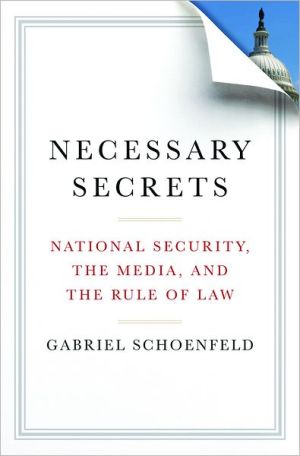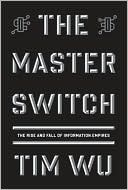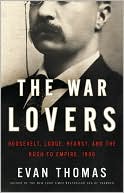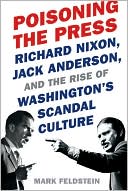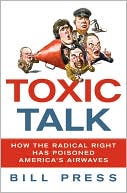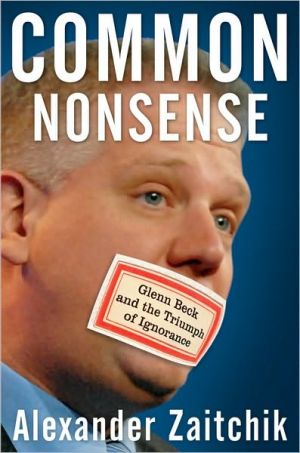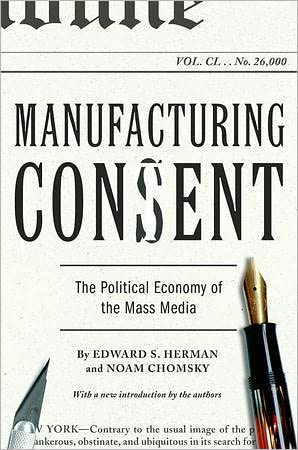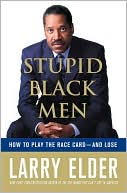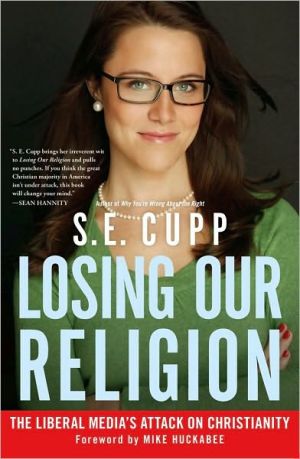Necessary Secrets: National Security, the Media, and the Rule of Law
Advance Praise for Necessary Secrets\ “Illuminating, extremely intelligent, learned, engaging, and important. This is a truly great book—the best account ever of the relationship between the press and the government concerning the protection and disclosure of national-security secrets, one that is centrally relevant to manifold national-security debates today.”—Jack Goldsmith, Henry L. Shattuck Professor of Law, Harvard University, author of The Terror Presidency\ \ “A serious work for a...
Search in google:
An intensely controversial scrutiny of American democracy’s fundamental tension between the competing imperatives of security and openness. The Washington Post - Leonard Downie Jr. …the weight of [Schoenfeld's] book's scholarship, the timeliness of its publication and the audacity of its argument make it essential reading for anyone seriously interested in national security and freedom of the press in these testing times.
Preface 11\ Introduction 17\ 1 Without Fear or Favor? 27\ 2 Secrets of the Founders 54\ 3 "Highly Dangerous to the Publick Safety" 68\ 4 Clear and Present Danger 83\ 5 The Black Chamber 102\ 6 The Price of Impunity 123\ 7 The "Patriotic Press" 141\ 8 To the "Ramparts" 154\ 9 Unnecessary Secrets 168\ 10 Ellsberg's Epigones 193\ 11 Black-Letter Law 221\ 12 A War on the Press? 232\ 13 The Peculiar Culmination 248\ 14 No Matter the Cost 260\ Acknowledgments 277\ Notes 281\ Index 297
\ Publishers WeeklyThe December 2005 publication of a front-page New York Times piece about an NSA wiretapping program is the inciting incident at the heart of this provocative consideration of the conflict between the need for government secrecy and the role of a free press. Schoenfeld (The Return of Anti-Semitism), senior fellow at the Hudson Institute, publicly accused the paper of violating the law when it published the article. Here, the author concerns himself less with the specifics of the 2005 incident than the larger theoretical and historical questions it raises. The book goes back to the First and Second Continental Congresses to show that the founders believed the defense of national security made complete transparency impossible. It then jumps ahead to the 1917 Espionage Act, the critical legislation, in Schoenfeld's thesis, locating where secrecy and security trump freedom of the press—as it did until Daniel Ellsberg's leak of the classified Pentagon Papers to the Times. If Schoenfeld's argument sometimes feels one-sided, he succeeds in scrutinizing an issue of vital importance and putting it into a much broader context. (May)\ \ \ \ \ The New York Times Book ReviewIn his aptly titled book Necessary Secrets, Gabriel Schoenfeld, a senior fellow at the Hudson Institute, has presented a subtle and instructive brief challenging the right of the press to make unilateral decisions to ‘publish and let others perish’…. Schoenfeld is scrupulously honest in discussing the real costs of unilaterally decisions by the press…. [He] skillfully presents a counter-history of the famous cases of the 60s, 70s and 80s that established the Supreme Court’s jurisprudence governing the right to publish secrets.— Alan M. Dershowitz\ \ \ Washington PostThe weight of his book's scholarship, the timeliness of its publication and the audacity of its argument make it essential reading for anyone seriously interested in national security and freedom of the press in these testing times.— Leonard Downie Jr.\ \ \ \ \ Alan M. DershowitzSchoenfeld is at his best when discussing this controversial genre—secrets whose disclosure would, in the view of the government, endanger national security, but whose disclosure, in the view of the press, might ultimately serve the national interest. The real issue is not whether such secrets should be published, since that question will often be a close one about which well-intentioned people will disagree. The real issue, as it often is in a democracy, is who should be entrusted to make this real-time decision…Schoenfeld simply but persuasively demands an honest accounting by those who would make the case for publishing national security secrets in real time.\ —The New York Times\ \ \ \ \ Leonard Downie Jr.…the weight of [Schoenfeld's] book's scholarship, the timeliness of its publication and the audacity of its argument make it essential reading for anyone seriously interested in national security and freedom of the press in these testing times.\ —The Washington Post\ \ \ \ \ Kirkus ReviewsA Hudson Institute scholar examines the enduring tension between the government's need to preserve certain secrets and the role of a free press. In December 2005, basing its article on leaked documents, the New York Times reported the details of a National Security Agency program to tap al-Qaeda phone calls and e-mails, which the paper characterized as unambiguously illegal. President Bush called the decision to publish "shameful." Schoenfeld (The Return of Anti-Semitism, 2004) insists that the Times should have been prosecuted for this breach of security and for its subsequent decision to print the particulars of an intelligence program tracking terrorist financing. First Amendment absolutists, once apprised of the author's conclusion, will likely ignore the rest of the book-which is a shame, because they'll miss an intellectually muscular argument that chisels away at some cherished myths. Fully aware of the need for transparency in a vibrant democracy, and cognizant of the state's duty to protect its citizens, Schoenfeld understands that neither the government, with its inclination to overclassify and penchant for selective, self-interested leaking, nor the press, with its competitive imperatives, is a wholly clean actor in the ongoing contest between the public's right to know and its equally valid interest in security. As backdrop to his argument in favor of more stringent security and to legal proceedings that might extend to journalists, the author offers an efficient survey of famously unauthorized press disclosures, including the 1970s cases of Daniel Ellsberg and the 1985 case of Samuel Morison, the only successful prosecution-for reasons Schoenfeld makes clear-of a leaker inU.S. history. Throughout, the author relies on pertinent statutory and case law to demonstrate that the rules clearly contemplate criminal prosecutions covering journalists, notwithstanding any chilling effect on the press. Despite his predilections, Schoenfeld wisely counsels discretion, urging the government to distinguish between what's right and proper from what's wise and prudent, and for the press to understand that public tolerance of heedless behavior has limits. A timely, sure-to-be controversial take on a problem that has no easy resolution. Author tour to New York and Washington, D.C.\ \
